As Kabul continues to relax a week after the end of the American bombing, the see-saw of war is bringing new and heavier terror to the people of Afghanistan's second city, Kandahar.
Apparently determined to destroy the Taliban leadership and prevent any chance of a negotiated end to their rule in the region which is their spiritual headquarters, the US has stepped up its air raids on Kandahar by day and night.
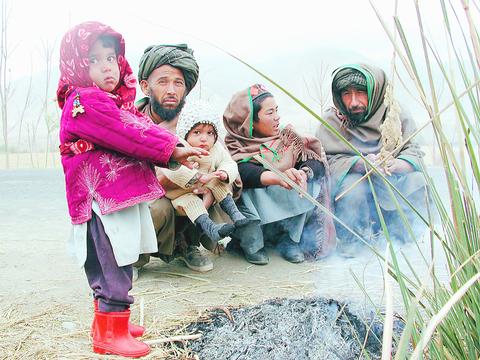
PHOTO: AP
The Pentagon confirms the strategy, as do the thousands of refugees pouring out of the city. On the second day of their excursion for foreign journalists, Taliban commanders Tuesday took the press to a huge new refugee camp on the road between the border town of Spin Boldak and Kandahar.
"My house is about 500m from the deputy governor's," said Harehmatullah, a 25-year-old who left Kandahar four days ago. "The bombing is getting heavier and heavier. It goes on in daylight and not just in the night. We could not take it any longer."
Another man who left Arghandab near Kandahar four days ago said US aircraft seemed to be trying to hit Taliban vehicles as they drove along the road near his home. Sultan Mohamed, 60, stood outside the small patch of desert which he has expropriated by driving wooden poles into the sand and hanging blankets and pieces of sacking between them as a wind-breaker. Children sat on carpets laid out inside his makeshift home.
"We became so afraid of the loud sounds every night," his wife Fatima Bibi called out in a break in the tradition among uneducated Afghans which prevents women from addressing male strangers, even in their husband's presence.
Desperation bends the rules and she pleaded with us for help. "Even if the bombing stops, we will never go back to Kandahar again.
Never. I am so afraid," she said.
Three weeks ago this camp did not exist. Now it already has 1,500 tents, financed by a charity linked to the royal house of the United Arab Emirates. Even taking a conservative average of six people per family, this brings the total up to 9,000 -- three times the estimate which officials of the UN High Commission for Refugees gave in Quetta.
Mullah Mohammed Sayeed Haqani, the local Taliban commander, said at least 6,000 of the latest refugees at this camp were from Kandahar. Others were people who had fled the bombing in other parts of Afghanistan but were blocked here because Pakistan has closed the border.
But this is not the end of the problem. At the back of the neat rows of white canvas, we saw another huge area of home-made dwellings, too many to count in a short visit. Along the main road, where they had been dumped by lorries and buses, were the most abject of the new poor. They sat among their bundles waiting for the strength to move into the camp.
The camp we visited is one of four in the Spin Boldak area, each apparently just as large. This means the bombing could have prompted between 50,000 and 100,000 to leave their homes to find safety.
Camels wandered through parts of the camp, making it clear that some of the people were traditional nomads who pasture their animals in the mountains in summer and return to the plains for winter. But Spin Boldak is not their normal resting place, and as one refugee from Kandahar said: "Even the nomads don't know where to go these days."
The authorities have clearly been overwhelmed by the problem. With the UAE money they have built brick latrines, and put up metal water tanks with taps. Seven tents have been set aside for a clinic which claims to be ready to look after people wounded by bombing as well as the sick. But we saw no wounded patients, nor any sign that the clinic had facilities to handle any serious injuries.
Children were playing football near one large tent which serves as a mosque. Several small open-air mosques had been laid out on the floor of the desert.
Even in this desolate place the refugees cannot escape the sounds, and memories, war. The drone of a high-flying plane cut through the air as we walked round the tents, probably on its way to or from Kandahar. Everyone stopped in their tracks to look up.
Children following us round suddenly looked nervous.
But Commander Haqani insisted that the ferocious bombing was not having any political effect. He denied any talks were going on with Pashtun representatives of the former king, Zahir Shah, or tribal leaders opposed to the Taliban. "We don't know who these people are or how they intend to contact us. It's just American satellite TV channels they talk to. There is nothing to negotiate about."
On that, at least, he agrees with the men behind the bombing.
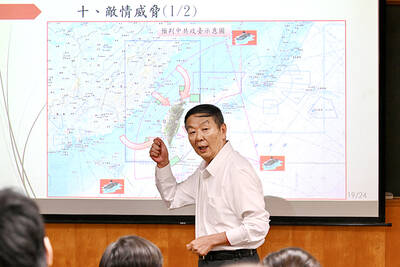
RETHINK? The defense ministry and Navy Command Headquarters could take over the indigenous submarine project and change its production timeline, a source said Admiral Huang Shu-kuang’s (黃曙光) resignation as head of the Indigenous Submarine Program and as a member of the National Security Council could affect the production of submarines, a source said yesterday. Huang in a statement last night said he had decided to resign due to national security concerns while expressing the hope that it would put a stop to political wrangling that only undermines the advancement of the nation’s defense capabilities. Taiwan People’s Party Legislator Vivian Huang (黃珊珊) yesterday said that the admiral, her older brother, felt it was time for him to step down and that he had completed what he
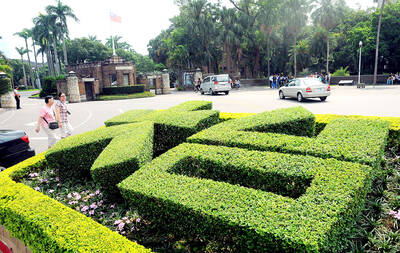
Taiwan has experienced its most significant improvement in the QS World University Rankings by Subject, data provided on Sunday by international higher education analyst Quacquarelli Symonds (QS) showed. Compared with last year’s edition of the rankings, which measure academic excellence and influence, Taiwanese universities made great improvements in the H Index metric, which evaluates research productivity and its impact, with a notable 30 percent increase overall, QS said. Taiwanese universities also made notable progress in the Citations per Paper metric, which measures the impact of research, achieving a 13 percent increase. Taiwanese universities gained 10 percent in Academic Reputation, but declined 18 percent
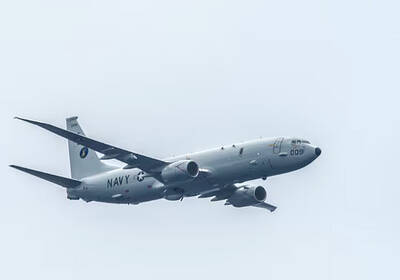
CHINA REACTS: The patrol and reconnaissance plane ‘transited the Taiwan Strait in international airspace,’ the 7th Fleet said, while Taipei said it saw nothing unusual The US 7th Fleet yesterday said that a US Navy P-8A Poseidon flew through the Taiwan Strait, a day after US and Chinese defense heads held their first talks since November 2022 in an effort to reduce regional tensions. The patrol and reconnaissance plane “transited the Taiwan Strait in international airspace,” the 7th Fleet said in a news release. “By operating within the Taiwan Strait in accordance with international law, the United States upholds the navigational rights and freedoms of all nations.” In a separate statement, the Ministry of National Defense said that it monitored nearby waters and airspace as the aircraft
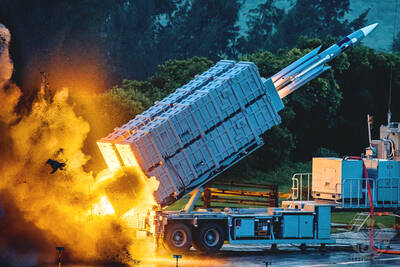
UNDER DISCUSSION: The combatant command would integrate fast attack boat and anti-ship missile groups to defend waters closest to the coastline, a source said The military could establish a new combatant command as early as 2026, which would be tasked with defending Taiwan’s territorial waters 24 nautical miles (44.4km) from the nation’s coastline, a source familiar with the matter said yesterday. The new command, which would fall under the Naval Command Headquarters, would be led by a vice admiral and integrate existing fast attack boat and anti-ship missile groups, along with the Naval Maritime Surveillance and Reconnaissance Command, said the source, who asked to remain anonymous. It could be launched by 2026, but details are being discussed and no final timetable has been announced, the source